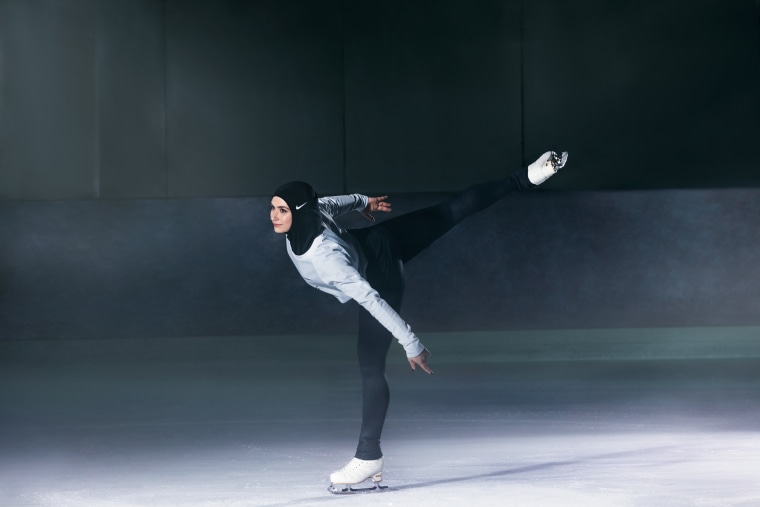Recently, Nike introduced the Pro Hijab, its first hijab, designed for Muslim female athletes. Scheduled for an early 2018 release, the product has been met with mixed views.
Some have criticized Nike on social media (propagating the hashtag #boycottNike), claiming that the product, which is scheduled to debut in early 2018, supports the oppression of women. Others are lauding the brand for a move toward equality, diversity, and acceptance in politically tense times.
But what about the opinion of the consumers to whom the brand is actually looking to sell: Muslim, hijab-wearing women who've been buying athletic hijabs from other brands for years?
Athletic Hijabs Are New for Nike, But Not for Consumers
"As a Muslim woman who wears a hijab, I applaud major brands such as Nike catering towards Muslim women — but at the same time they are a few years late," said Aisha Manzoor, secretary of the Rhode Island Council of Muslim Advancement, based in Providence.
Related: Muslim Headscarf Ban Ruled Legal in European Workplaces
Will the new Nike product steal the thunder from brands that have been dedicated to Islamic sports apparel on a smaller scale? This is Manzoor's concern.
"There are Muslim brands out there — both international and American — who have been doing this for a long time," said Manzoor. "I hope Nike will bring attention to the brands that have been doing this, and shed light on their work."
Too Little, Too Late, and Too Pricey?
Sherin Sultana, an occupational therapist and a Muslim-American woman who wears a hijab, has "mixed views" on Nike's Pro Hijab, similar to Manzoor's.
"I think it's great that such a large corporation has finally recognized the need for more comfortable head-covering for [Muslim women] athletes, but it's a little too late," Sultana said. "There are many Muslim-owned companies that have been making breathable workout hijabs to cater towards women who cover, but smaller companies obviously don't get as much recognition."
Asiya, Capsters, and Artizara are among the list of Muslim brands that design athletic hijabs. Prices range depending on quality and style.
"I'd say the range for an athletic hijab is between $15 and $45," Manzoor told NBC News, adding that she owns four athletic hijabs from different brands. "If you're a really [dedicated] athlete, you may go for a more high-end one, but for a fellow hijabi like me who just uses the treadmill most days for an hour or two, I won't spend $45."
Is it consideration for Muslim women — or a blatant cashing in on a culture that has been meeting its own needs just fine?
Nike's Hijab Pro will cost around $35 — not exactly on the bargain end of the spectrum. Though it's a bit more than she likes to spend, Manzoor say she's curious and will likely buy one.
"I am willing to give anything a try and am looking forward to seeing what the Pro Hijab will look like," said Manzoor. "I also saw that they're working with famous [Muslim] athletes, so that pulls me and I think other Muslims in."
Related: Consumers Launch New Balance Boycott After Executive Voices Trump Support
While no Nike product is particularly inexpensive, Sultana wonders whether the Pro Hijab is being released from a place of genuine consideration for Muslim women — or if it's more of a blatant cashing in on a culture that has been meeting its own needs just fine.
"Nike launching their own line really advertises a bigger price tag," said Sultana. "It kinda seems like it's more for the money than the need."
Normalizing Islamic Culture
Skepticism aside, Sultana notes that "this feels like [Nike] taking a step toward normalization and acceptance" of Islamic culture. Arguments that the Pro Hijab is too late, too expensive, and not necessarily in demand by the Muslim athletic community shouldn't be shrugged off, but they may pale next to the message the product sends the world.
"Regardless of the values driving this new product, it is always a welcomed move when corporations and media normalize the presence of Islam and Muslims in our world and especially in the U.S.," said Hussam Ayloush, an executive director at the Council on American-Islamic Relations. "Such normalization helps weaken the rhetoric of fear and bigotry advanced by the powerful Islamophobia industry."
Related: French Mayor Bans Burkinis on City Beaches
And remember, Nike is an international brand with a huge presence across the globe. It's simply economically intelligent to be providing for Muslim consumers not just in the U.S but everywhere.
"One out of four people in our world is Muslim," points out Ayloush. "It makes good business sense to cater to such a large segment of consumers. Over the past decade, we have seen many major corporations cater to this rapidly growing consumer market by introducing halal and other Sharia-compliant items, such as clothing, food, and financial products."
Opening Up Competition
There's also reason to think that Nike's debut of its hijab could benefit the smaller Muslim brands that have been long designing similar products. By spotlighting the Pro Hijab, Nike is (whether it means to or not) casting light on an entire sector of the women's sportswear industry. It could also likely stimulate competition from other brands.
"Nike entering this market will help bring attention to the existence and profitability of this growing market; hence attracting many more corporations and products," said Ayloush. "This increased supply will also provide the Muslim consumers with more options, improved quality, and possibly reduced prices."
Nike is also surely inspiring other big brands to consider bringing their own version of an athletic hijab to market.
"The biggest surprise for me would be if Nike’s competitors like Adidas and Under Armour don’t immediately follow suit," said Frank Zaccanelli, former Dallas Mavericks co-owner and general manager. "They better not waste any time."
